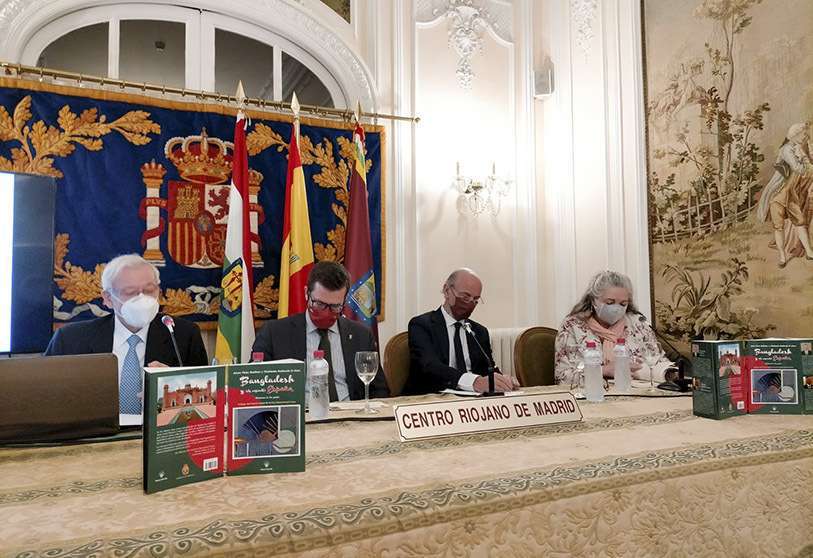Bangladesh and (suddenly) Spain

Although in recent times there has been a change in trend, Spanish diplomats are not characterised by a voluminous literary production accessible to the general public. The archives of the Ministry of Foreign Affairs are surely full of dossiers, notes and secret communications that could be used to trace the tempestuous history of successes and mistakes, in some cases decisive and transcendental, but always with consequences, that have shaped Spain's role in the world.
Ambassador Arturo Pérez Martínez provides us with a document that is both illustrative and curious about one of the countries in which he served, usually far from the media spotlight, only coming to the forefront in the wake of the annual and severe monsoon floods, or because of the human tragedies caused by the collapse of buildings, under the rubble of which hundreds of textile workers perish.

Bangladesh and (suddenly) Spain. Historias de dos países' (Ed. Nueva Estrella), written with Bangladeshi-Spanish professor Chaklader Mahboob-Ul Alam, tells us all this and much more, starting with the vicissitudes involved in opening an embassy. And what had Spain missed to install a full diplomatic representation in Dhaka? When Ambassador Pérez Martínez receives the assignment in 2007, Spain is the destination of massive illegal Bangladeshi immigration, so his first mission will be to change this flow into legal channels, a task he himself admits he did not manage to complete successfully. It is also the culminating moment of the relocation of many European and, of course, Spanish companies to Asia, thanks to notably lower wages and working conditions that are far removed from the parameters required in the European Union.
Without shedding his diplomatic status, Pérez Martínez does not dodge any of the delicate issues in Spanish-Bangladeshi relations, including the ever-present problem of corruption and the commissions, or rather bribes, that any businessman has to face in order to work in that and any other Asian country with any guarantee of success.

Obviously, the first condition for an ambassador who is worthy of such a title is to have a thorough knowledge of the country in which he or she is the official representative of his or her country of origin. Arturo Pérez Martínez and Chaklader Mahboob-Ul Alam, without overwhelming the reader, offer a historical and geographical overview of great interest, seasoned with the most recent episodes, especially the process of independence first from the British Empire as East Pakistan, and then as a breakaway from the latter, naturally with the help of India, and the corresponding construction of the country, led by Sheikh Mujibur Rahman, who was assassinated along with his family in 1975. The criminal trial of the perpetrators of the massacre would not begin until 1996, but dragged on until 3 January 2010, when the court handed down five death sentences, executed after midnight on 27 January after the last appeals had been exhausted and requests for postponement from European ambassadors, then under the rotating EU presidency of the Spaniard, were ignored.
But, along with the bitter pains of attending and even "failing" in situations like this, there are many others in which a management, mediation, decision or decisive intervention is successful, which translates into avoiding a prolonged arrest, or perhaps something more serious; a company that finally manages to establish itself, take off and multiply its production, or the opening of new channels of relations and business between entrepreneurs from both countries.

The book, profusely illustrated with impeccably edited maps and photographs, closes with the discovery of some of the many monuments of historical and tourist interest that Bangladesh contains, a guide that is of great interest to the immense number of people who have never set foot in a country that no longer needs Spanish development aid funds, a consequence of the exponential multiplication of its GDP. It is the culmination of a complete journey through a territory with more than four thousand years of history, prefaced in the book by the Nobel Peace Prize winner Muhammad Yunus, the economics professor who invented micro-credits and inspired the world of the three zeros: zero poverty, zero net carbon emissions and zero unemployment. It is a brief but gigantic programme for a world that is as globalised as it is interdependent. It is he himself who praises this work, describing it as "ambitious, but concise", after acknowledging that he did not expect such a complete and varied result with respect to the first book of its kind that, to his knowledge, has appeared in Spanish.









